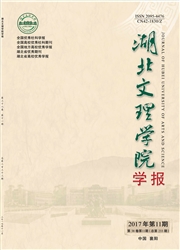

 中文摘要:
中文摘要:
著名诗人臧克家于1938年秋来到襄阳,参与国民党第五战区的文艺宣传工作和"文协"襄阳分会的工作,1939年至1940年初他和姚雪垠、孙陵等人以老河口为基地数次奔赴抗战前线采访报道,一方面在前线进行文艺宣传,另一方面也开展文学创作。1941年1月臧克家又到驻守在南漳的三十军任参议,开展抗战文艺工作,直至1941年初夏离开襄阳。臧克家在襄阳一带参加抗战文艺工作近三年之久,在襄阳各地留下了深深的足迹,也与襄阳结下了深厚的情谊,襄阳为战地上奔波的臧克家提供了安静写作的"书房"和材料丰富的"诗囊",臧克家的文学书写记录了襄阳的抗战史,亦丰富了襄阳的抗战文学,使襄阳的抗战文学成为全国抗战文学一个重要的组成部分。
 英文摘要:
英文摘要:
Zang Kejia, a well - known Chinese poet, paid a visit to volved in literature and art popularization in the KMT fifth war zone Xiangyang City in the autumn of 1938, and inas well as the service for China Literature Association (Xiangyang Branch). From 1939 to early 1940, he, in company with Yao Xueyin, Sun Lin and some others, had made numerous visits from Laohekou to the war zone for news gathering and reports. In the meantime, they were engaged in the campaigns to improve the publicity as well as the writing production with regard to literature and art. In January 1941, Zang served as a consultant for the KMT 30th Corps stationed in Nanzhang and con- tinued to offer his help in anti - Japanese propaganda activities. Prior to his departure in early summer 1941, he had stayed in Xiangyang City and participated in activities above - mentioned for about three years, leaving his foot- marks in many areas of this city and forging a deep friendship with this land and its people. In this sense, Xiangy- ang had played a role more like a peaceful "study" to generate his creativity and rich "granary" for him to compose poetry when he was busy travelling between the battlefront and the rear - area here. Therefore, Zang' s literature has kept a record of Xiangyang City' s history City' s "anti - Japanese war" literature, which wide studies in similar areas. regarding anti -Japanese war. It has also enriched the Xiangyang has now been promoted to be an important component of the nation-
 同期刊论文项目
同期刊论文项目
 同项目期刊论文
同项目期刊论文
 期刊信息
期刊信息
